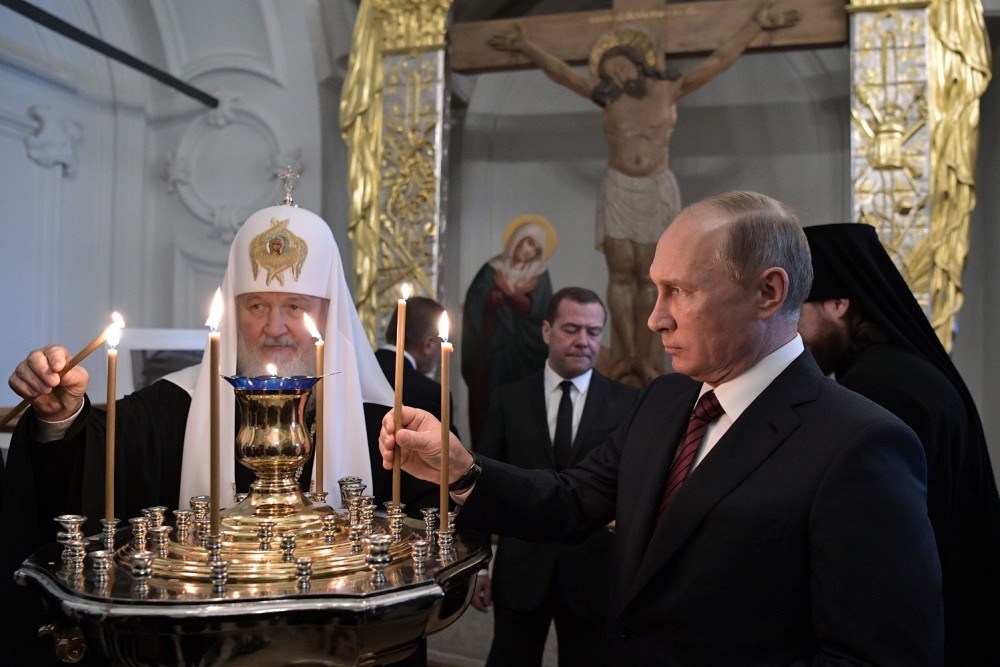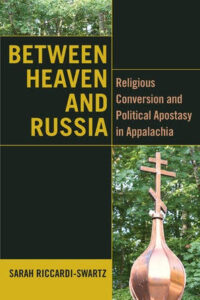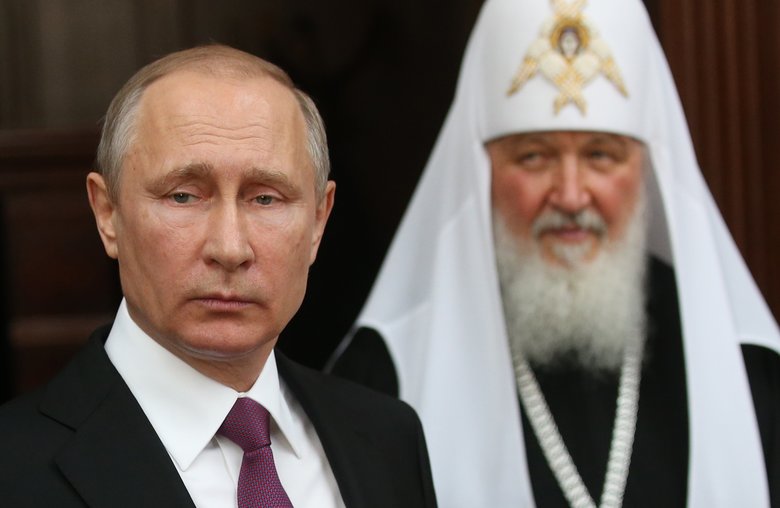Putin’s Christian Russia as a Model for America
An excerpt from Between Heaven and Russia: Religious Conversion and Political Apostasy in Appalachia

(Image source: Alexey Nikolsky for Getty Images)
The following excerpt comes from Sarah Riccardi-Swartz’s book Between Heaven and Russia: Religious Conversion and Political Apostasy in Appalachia, published by Fordham University Press. The book explores a community of American converts to the Russian Orthodox Church in West Virginia.
This excerpt comes from the book’s fifth chapter.
***
 Only ten miles separate the parish and the monastery, but in terms of support for Vladimir Putin, their reasons were often light years apart. While inhabitants of the monastery by and large seemed reticent, apart from Fr. Tryphon, to express political fealty to Putin, they often portrayed his role as almost apocalyptic in the future of global Christianity. Many monks drew upon the language of the Third Rome and the figure of Tsar-Martyr Nicholas II to portend what could happen in the face of growing secularism, and how Putin’s push for Christianity in the public sphere might be the only thing that saves the world. In contrast, to some extent, members of St. John’s parish viewed the president of the Russian Federation ideologically as a good candidate to promote Christian values globally. They tended to focus on current events that they heard about through various Russian government–sponsored media outlets or via word of mouth from Russian Orthodox Church Outside of Russia (ROCOR) clergy who frequently visited Russia. On the whole, both sets of converts supported Putin, but for different ideological reasons. Beyond the Orthodox convert community, most of the Woodford residents I spoke with were in no way aligned with Vladimir Putin or Russian political ideologies, yet they often spoke of him with fondness or, at the very least, admiration.
Only ten miles separate the parish and the monastery, but in terms of support for Vladimir Putin, their reasons were often light years apart. While inhabitants of the monastery by and large seemed reticent, apart from Fr. Tryphon, to express political fealty to Putin, they often portrayed his role as almost apocalyptic in the future of global Christianity. Many monks drew upon the language of the Third Rome and the figure of Tsar-Martyr Nicholas II to portend what could happen in the face of growing secularism, and how Putin’s push for Christianity in the public sphere might be the only thing that saves the world. In contrast, to some extent, members of St. John’s parish viewed the president of the Russian Federation ideologically as a good candidate to promote Christian values globally. They tended to focus on current events that they heard about through various Russian government–sponsored media outlets or via word of mouth from Russian Orthodox Church Outside of Russia (ROCOR) clergy who frequently visited Russia. On the whole, both sets of converts supported Putin, but for different ideological reasons. Beyond the Orthodox convert community, most of the Woodford residents I spoke with were in no way aligned with Vladimir Putin or Russian political ideologies, yet they often spoke of him with fondness or, at the very least, admiration.
The town mayor, who moved to the area as a child from the Pennsylvania Rustbelt, was from an Orthodox Hungarian background. One afternoon I sat down with him to chat about the area. He greeted me at the Woodford City Hall in a T-shirt and jeans with grease-covered hands: “I’d shake your hand, but I’ve been out back changing the oil in the fire truck.” A tall man, balding, with a dark tan, he was a former small business owner who worked for a nickel plant in the largest city nearby. At just over a year in office, the mayor stumped door-to-door during his campaign to get to know the residents, stressing a platform of economic stimulation and increased focus on fixing the aging infrastructure of the town. Not just a man of words, the mayor went right to work after the election, meeting with the city council to cut spending and create a budget that took the town from red to black by targeting the out-of-date water pipeline system. The mayor, in a similar fashion to many folks in town, believed the infrastructure and economy in Woodford were symptomatic of a decline in American standards and progress. While Vladimir Putin was not a key political figure for non-Orthodox
Christians in the town, the mayor, who noted that most of the citizens of Woodford voted for Donald Trump in the 2016 presidential election, believed that both politicians share values that people in the community, and in the region more broadly, desired in their elected officials.
“They’re a lot alike, ya know?” the mayor said to me, “Trump and Putin. They’re strong leaders. We need that. They get the job done. I don’t care what they do in their free time.”
The mayor’s statements echoed that of another elected official—at the state level—who was also from Woodford. A historian and member of the legislature, Edward lived in the area his entire life, growing up just down the road from the current location of the monastery. On a rainy spring day, we met at a local diner, one of the few that had signs out touting that their employees had received Hep-A vaccinations, a virus that was running rampant throughout the region at the time. In his early thirties, Edward’s buzzed black hair and large, round blue eyes gave him a youthful appearance. Over chili dogs, onion rings, and sweet tea we talked about the history of the county, particularly his publications about the formation of the towns and local government in the area, his job as a high school history teacher, the steady economic decline in West Virginia, and the sociality of mountain culture. As he fiddled with his high school ring and looked at the rain beating against the window, he recalled how regional views regarding the former Soviet Union were starting to change. During his youth, Russia was thought of in Cold War terms, with fear and apprehension surrounding anything to do with godless communism. In recent years, however, especially since the 2016 United States presidential election, as Edward specifically noted, the vocabulary regarding Russia was beginning to change. “My high school students say we should give him a chance,” Edward said in reference to Putin. “They’re getting that from someone, and it’s probably their parents.” Raised in the Church of Christ denomination, in a community not far from the diner, Edward noted that the region had always skewed conservative at the presidential level, but that right and alt-right ideologies were on the rise among youth. Harkening back to sociologist Robert Wuthnow’s study of moral rage in rural America, Edward’s stories indicated that the combination of poverty and isolation may have led to an increasingly politicized lifestyle.
Dean, a West Virginian ex-military convert to Russian Orthodoxy, husband to a Russian-born wife, and local schoolteacher, indicated that he had also seen a spike in conversations—both inside and outside of the classroom—about the importance of Vladimir Putin in global politics. Unlike his wife, Photini, who seemed reticent to support Putin wholeheartedly, Dean believed Putin might change the world for the better. Echoing the sentiments of Woodford’s mayor, Dean, who was a slender man in his early fifties with greying hair and glasses, suggested Putin provided a new form of conservative moral governance that would not back down in the face of modern secularism. Shy and uncomfortable with crowds, Dean tended to stand at the periphery during social occasions at the parish, talking with male congregants or simply people watching. One-on-one, however, he was a different man altogether. “I’m angry,” he yelled at me. “Do you want to know why?” Sitting at his dining room table in a craftsman style two-story house about forty minutes from the parish, he expressed his outrage at not being heard, being looked over as a white male in what he saw as an American progressive society too focused on minority rights. He was worried about the increased “diversity” in his neighborhood, and he was fed up with liberals. “I’m sick of it,” he said. “Do you know what I have upstairs? It might surprise you,” Dean smiled. Pointing to the ceiling right above the dining room table, he proudly proclaimed, “I have a safe full of weapons. There’s a war coming you know, and I want to be on the right side.” For Dean, who voted for Donald Trump in the 2016 election, Russia and Putin were the right side, for they represented a return of traditional masculinity to the political world, one that would bring with it Christian values and morality to the public sphere. While Dean was ready to take up arms for his adopted motherland, others seemed to have deep existential issues with understanding their place in the world. One parishioner mentioned that he would not know which side to fight for if a war broke out between Russia and the United States. Converts felt caught between two worlds in a tide of increasing political turmoil. Were they Russian? American?

(Image source: Mikhail Svetlov for Getty)
It was not only laypeople (non-clergy) who wrestled with these questions. One of the main figureheads of the Orthodox community was the abbot of the monastery, Fr. Spyridon. A midwestern convert by way of Catholicism, he was a Benedictine monk before he converted to Russian Orthodoxy. Fr. Spyridon drew on Cold War themes, noting how he believed that much of the issue surrounding Russia and Putin was Western liberal bias at play. I cite him here at length given the way in which he captured the sentiments of so many I spoke with over the course of my time in the community:
“It used to be in the past it was the conservatives who were anti-Russian and the liberals who were pro-Russian; now it’s all switched. A lot of it, as far as I’m concerned, is on a spiritual level. The two roles of our country, as I knew as a child in the fifties, have completely reversed. Our country now represents anti-Christianity and Russia represents Christianity. It’s really a complete reversal of roles. Russia is trying with all of its might to hold up Christian morality and Christian belief and defend Christians. President Putin is personally rebuilding all the churches in Syria that were destroyed. Not just Orthodox but Catholic and Uniates. He’s rebuilding all of the churches there. There’s no offer like that from America. There’s no one speaking up for persecuted Christians except for Russia. There really isn’t. But if Putin says something or Patriarch Kirill says something, the liberal press tears them apart: Who do you think you’re fooling? No one believes you. You’re just saying these things because you want to impress people. You want American evangelicals to support you. So, it’s a kinda of a no-win situation. No matter what Russia does, they’ll still tear them apart. If they do something good, they’ll say they’re fake. That’s the way the situation is now. We want to hear what they have to say, and if you’re really listening to what they are saying, and if you look at the evidence in their country, I don’t see how you can believe all these accusations against the Patriarch and against the president of Russia. I don’t see how you can believe it, because you look at how their country is living and how they’re turning their country away from . . . trying to turn it away from abortion, and sensuality, and immorality. You know, they’re trying very much to do all that. No one else is at all, but part of these issues that Russia stands for in terms of morality are issues that the liberal press holds very dear—transgender rights, gay marriages, women priests, and women bishops—these are all issues that are very important to the liberals and to liberal Christianity in the West. Russia is the opposite of that. It stands for traditional morality and traditional beliefs, and so they just don’t like Russia and they don’t like the Russian Church—not at all. They think the Russian Church is simply a tool of Putin’s government. They don’t see any sincerity at all. They look at our church and they look at our services and they don’t recognize anything, so they dismiss it. I don’t know what the future is gonna hold, if this thing doesn’t change and it keeps getting worse, I don’t know what that’s going to mean for us as Russian Orthodox Christians, as American converts to the Russian Church.”
Fr. Spyridon’s apocalyptic worries of persecution echoed that of most converts in Woodford, where it seemed as if the only Orthodox people not caught up in the grip of Putin fever were Russians themselves.
While communities of like-minded people often have overarching beliefs and ideologies, there are always dissenting opinions. With the case of Appalachian Russian Orthodox Christians, the dissenters came in the form of Russian-born believers. Photini—Dean’s wife—who immigrated to the United States in the early 2000s after receiving her doctorate, worried that Putin’s relationship with the Church was not as picturesque as religious leaders and Russian media outlets let on. Two other Russian women in the parish—Veronica and Masha—also worried that converts to the Russian Orthodox Church were too eager in their embrace of President Vladimir Putin and his political ideologies. Both women saw a turn for the worse in Russian economics, culture, and society since perestroika. Veronica, a former schoolteacher, moved from a small village in Russia to the United States for the sake of economic survival during Boris Yeltsin’s tenure. “I hate Yeltsin,” she said. “What he did to our country. . . .” In her late fifties, Veronica was a spry woman with short curly ash blonde hair, who favored turquoise jewelry and white lace outfits. At one of the biweekly summer gatherings of women at Masha’s house, I was the only other attendee besides the two women, since most of the female parishioners were either on vacation or attending a ROCOR summer camp with their children. Veronica and Masha decided to talk with me about their feelings surrounding convert beliefs, the relationship between Russia and the United States, and how they felt about Putin.
“It’s kind of weird,” Veronica chuckled in reference to Americans converting to Russian Orthodoxy. “Maybe it’s because it is just in our blood, in our bones.” Both women found, in some respects, a totalizing conversion—that of complete enculturation, political and otherwise—to be off-putting. Masha’s partner, Reynolds, converted to Orthodoxy after falling in love with her. However, his attraction to Russian political ideologies did not stem from his relationship with Masha, but rather his dedication to conservative values—political, moral, social, and economic. Whereas Reynolds saw Putin and, to a lesser extent, Trump, as strong figures with positive transformative social capabilities, Masha saw both leaders creating downward spirals for otherwise open, democratic cultures. For both Masha and Veronica, the Soviet Union was imperfect but supportive. “Things were so much better during the Soviet Union. I’m very disappointed in Putin,” Veronica sighed. The idea that converts could support monarchic theories and desire the return of tsarist Russia, even Tsar Putin, was appalling to both women. As Veronica poured rose-scented tea, she shook her head violently and said loudly, “The tsar is never coming back. Ridiculous.” One of the few Russians in the community who openly supported tsarist tendencies and Vladimir Putin’s ideologies was the parish priest’s wife—Matushka Olga—who immigrated from Kazakhstan as a young adult. After spending a year conversing with Matushka Olga, it was evident that her ideas about the Russian government and Putin were deeply affected by Father Cyril, a convert. Given the overall leeriness with which many Russian-born ROCOR members in this community approached Russia’s political regime, it begs the question as to why converts were so attracted to Vladimir Putin, his seemingly illiberal and or autocratic politics, and the potential return of kingship to Holy (adopted) Mother Russia.
Sarah Riccardi-Swartz is the author of Between Heaven and Russia: Religious Conversion and Political Apostasy in Appalachia and a postdoctoral fellow in the Recovering Truth: Religion, Journalism, and Democracy in a Post-Truth Era project at the Center for the Study of Religion and Conflict at Arizona State University.
***
Interested in more on this topic? Check out our fascinating conversation with Sarah Riccardi-Swartz in episode 23 of the Revealer podcast: “For the Love of Putin: American Converts to the Russian Orthodox Church.”